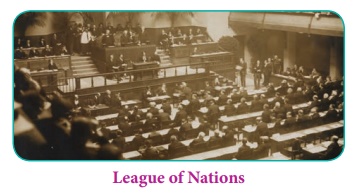Imperialism and its Onslaught | History - League of Nations | 12th History : Chapter 13 : Imperialism and its Onslaught
Chapter: 12th History : Chapter 13 : Imperialism and its Onslaught
League of Nations
League of Nations
League of Nations was the brainchild of American
president Woodrow Wilson. It was Wilson’s desire that a League in which the
states of the world would join and cooperate for the preservation of peace be
established. The Covenant of the League was worked out at the Paris Peace
Conference, and included every treaty signed after the First World War. He
believed that the defeat of Germany would mean the rejection of militarism and
therefore the organisation of a comity of nations to control international
relations was necessary rather than the ineffective balance of power. Wilson
took personal interest to see that this task was accomplished.

Structure and Composition
In drawing up the constitution of this
organisation, the ideas of Britain and America prevailed. The League consisted
of five bodies: the Assembly, the Council, the Secretariat, the Permanent Court
of Justice, and the International Labour Organisation. Each member-country was
represented in the Assembly. It discussed general policy and any decision taken
in the Assembly had to be unanimous. The Council was the executive of the
League. Britain, France, Italy, Japan and the United States were originally
declared permanent members of the Council. Each member had one vote and since
all decisions had to be unanimous, even the small nations, in effect, possessed
the right of veto.
Secretariat
The Secretariat of the League of Nations was
located at Geneva and the first Secretary General was Sir Eric Drummond from
Britain. The International Court of Justice was set up in The Hague. The
International Labour Organisation comprised a secretariat and a general
conference which included four representatives from each country.
Objectives of the League
The two-fold objective of the League of Nations was
to avoid war and maintain peace in the world and to promote international
cooperation in economic and social affairs. The League intended to act as
conciliator and arbitrator, and thereby resolve a dispute in its early stages.
If wars should break out despite arbitration, the members were to apply
sanctions to the aggressor - first economic and then military. The difficulty
in achieving the objectives was increased from the beginning by the absence of
three Great Powers namely USA (did not become a member), Germany (a defeated
nation) and Russia. The latter two joined in 1926 and 1934. While Germany
resigned in 1933, Russia was expelled in 1939.
Activities of the League
Between 1920 and 1925, the League was called in to
settle a number of disputes and was successful in three issues. In 1920 a
dispute arose between Sweden and Finland over the sovereignty of the Aaland
Islands. The League ruled that the islands should go to Finland. In the
following year the League was asked to settle the frontier between Poland and
Germany in Upper Silesia, which was successfully resolved. The third dispute was
between Greece and Bulgaria in 1925. Greece invaded Bulgaria, and the League
ordered a ceasefire. After investigation it decided that Greece was to pay
reparations.
The League justified its existence through
reduction of international opium traffic and in the control of spread of
disease by aiding poor and backward countries. Its agencies collected huge data
on labour and business conditions throughout the world. It conducted
plebiscites in disputed areas and helped in finding homes for refugees. It made
a beginning in codifying international law.
Incidents of Violations
One of the major problems confronting the European
powers was how to achieve disarmament. In 1925 the Council of the League set up
a commission to hold a Disarmament Conference. But the proposed conference
materialised only in 1932. In this Conference, Germany’s demand of equality of
arms with France was rejected. Hitler withdrew Germany from the Conference and
the League.
The League could do nothing about the seizure of
Vilna by Poland in 1920. In 1923, when war threatened to break out between
Italy and Greece, Italians refused to submit to the mediation of the League.
Japan attacked Manchuria in September 1931 and the League condemned Japan.
Japan followed the example of Germany and resigned. In the context of Italy’s
attack on Ethiopia, the League applied sanctions. As the sanctions came into
effect, Italy in protest resigned from the League in 1937.
Thereafter the League was a passive witness to
events, taking no part in the crises over the Rhineland, Austria,
Czechoslovakia and Poland. The last decisive action it took was in December
1939 when Russia was expelled for attacking Finland. The Assembly did not meet
again and the League of Nations was finally dissolved in 1946.
Causes of Failure
The League appeared to be an organisation of the
victors in the First World War. Though it had a world-wide membership, it was
very much the centre of European diplomacy.
Unanimity of members was required for all its
decisions on political issues. Since it lacked military power of its own, it
could not enforce its decisions.
The founders of this peace organisation
underestimated the potential of nationalism. The principle of “collective
security’ could not be applied in actual practice.
The League of Nations was shown to have no teeth.
It depended wholly on the good will and positive approach of all nations. When
Italy, Japan and Germany, headed by dictators, refused to be bound by the
orders of the League, Britain and France were the only major powers who had the
power to act. But they were not enthusiastic supporters of the League, as it
was the brainchild of Wilson.
Related Topics